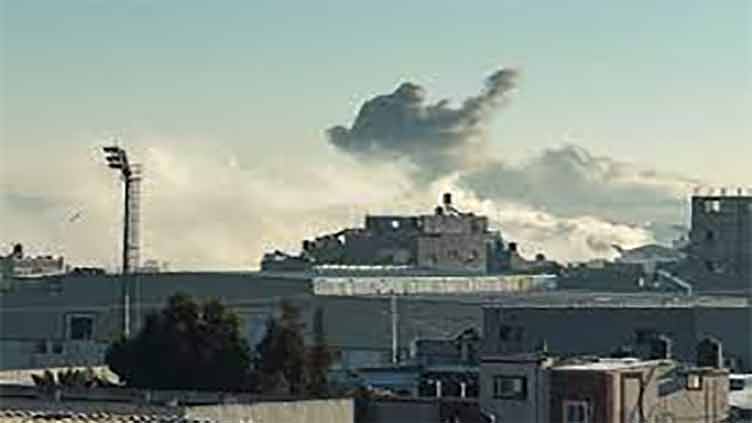Israel-Hamas fighting convulses Gaza as US seeks protection of civilians

World
Israel-Hamas fighting convulses Gaza as US seeks protection of civilians
CAIRO/GAZA (Reuters) - Israeli and Hamas forces battled throughout Gaza on Friday, witnesses said, suggesting Israel's ground offensive was meeting stiffer resistance as the U.S. pushed its ally to alter a war strategy that has inflicted a huge civilian death toll.
Residents in the small enclave reported fighting in Sheijaia, Sheikh Radwan, Zeitoun, Tuffah, and Beit Hanoun in north Gaza, east of Maghazi in central Gaza and in the centre and northern fringes of the main southern city of Khan Younis.
Hospitals in Deir al-Balah, Khan Younis and Rafah reported a new influx of dead and wounded early on Friday including two children. Four people were killed in an Israeli air strike on a house in Rafah and Israeli tanks were shelling targets just east of the city near the Egyptian border, medics and witnesses said.
The Israeli military said in an update on Friday its forces had destroyed a Hamas command and control hub in Gaza City's Sheijaia district, conducted a "targeted raid" on militant infrastructure in Khan Younis, and bombed sites in the Rafah area that helped Hamas to smuggle weapons into Gaza.
The heavy fighting, confirmed by many residents and militant sources reached by Reuters, raised questions about whether Israel's two-month-long aerial and ground blitz of Gaza has significantly weakened Hamas, which it has vowed to annihilate.
"The Gaza Strip turned into a ball of fire overnight, we could hear explosions and gunshots echoing from all directions," Ahmed, 45, an electrician and father of six, told Reuters from a shelter in a central area of the densely populated enclave.
"They can destroy homes and roads and kill civilians from the air or through blind tank shelling, but when they come face to face with the resistance, they lose. We don't have anything to lose after all they had done to our Gaza," he said.
Unrelenting Israeli bombardment has laid much of the narrow coastal strip to waste over the past two months, with nearly 19,000 people confirmed dead, according to Palestinian health officials, and thousands more feared buried under the rubble.
Israel launched its onslaught in retaliation for a surprise cross-border rampage by Hamas, the Iran-backed group that rules Gaza, whose fighters stormed nearby Israeli communities, killed 1,200 people and seized 240 hostages on Oct. 7.
Israeli Prime Minister Benjamin Netanyahu told visiting U.S. National Security Adviser Jake Sullivan on Thursday that Israel would be at war with Hamas "until absolute victory". This, Defence Minister Yoav Gallant said, "will last more than several months - but we will win and we will destroy them".
There has been no sign of a halt in the hostilities, with Israeli assertions in late November to have largely subdued the heavily urbanised north of Gaza appearing to be a chimera.
However, Israeli government spokesperson Eylon Levy told a briefing on Friday that Israel was "clearly winning the war right now" by having "significantly degraded Hamas' capabilities inside Gaza", noting a dramatic drop in rocket fire into Israel.
The spread of ground war after a week-long pause that enabled the release of 110 hostages has frustrated plans to step up deliveries of desperately needed basic supplies for civilians to survive as their homes have been destroyed.
Over 80 percent of Gaza's 2.3 million people have been displaced, some repeatedly.
NEW 'PRECISION' PHASE IN ISRAEL'S WAR COMING?
Washington has been pressing Israel for weeks to do more to reduce civilian casualties as a global outcry over a spreading humanitarian catastrophe, with medical care crippled and food, fuel and drinking water widely unavailable, has intensified.
Sullivan said on Friday after "very constructive talks" with Netanyahu that the war would transition to a new phase focused on precise targeting of Hamas leaders and on intelligence-driven operations.
Sullivan told a news conference it would take months to achieve Israel's objectives in the war, but that fighting would proceed in phases, with a shift from the current campaign of heavy, widescale bombing and armoured ground operations that has been so deadly for civilians, including thousands of children.
"The conditions and the timing for that was obviously a subject of conversation I had with" Netanyahu, other Israeli government leaders and military commanders, added Sullivan.
He also said Washington wanted "to see the results" that match Israel's assurances that it distinguishes between civilians and militants.
Israel says Hamas uses civilians and civilian buildings as shields, an allegation it denies, but allies and adversaries alike, as well as the U.N. and humanitarian and rights groups, say Israel has done too little to protect non-combatants.


